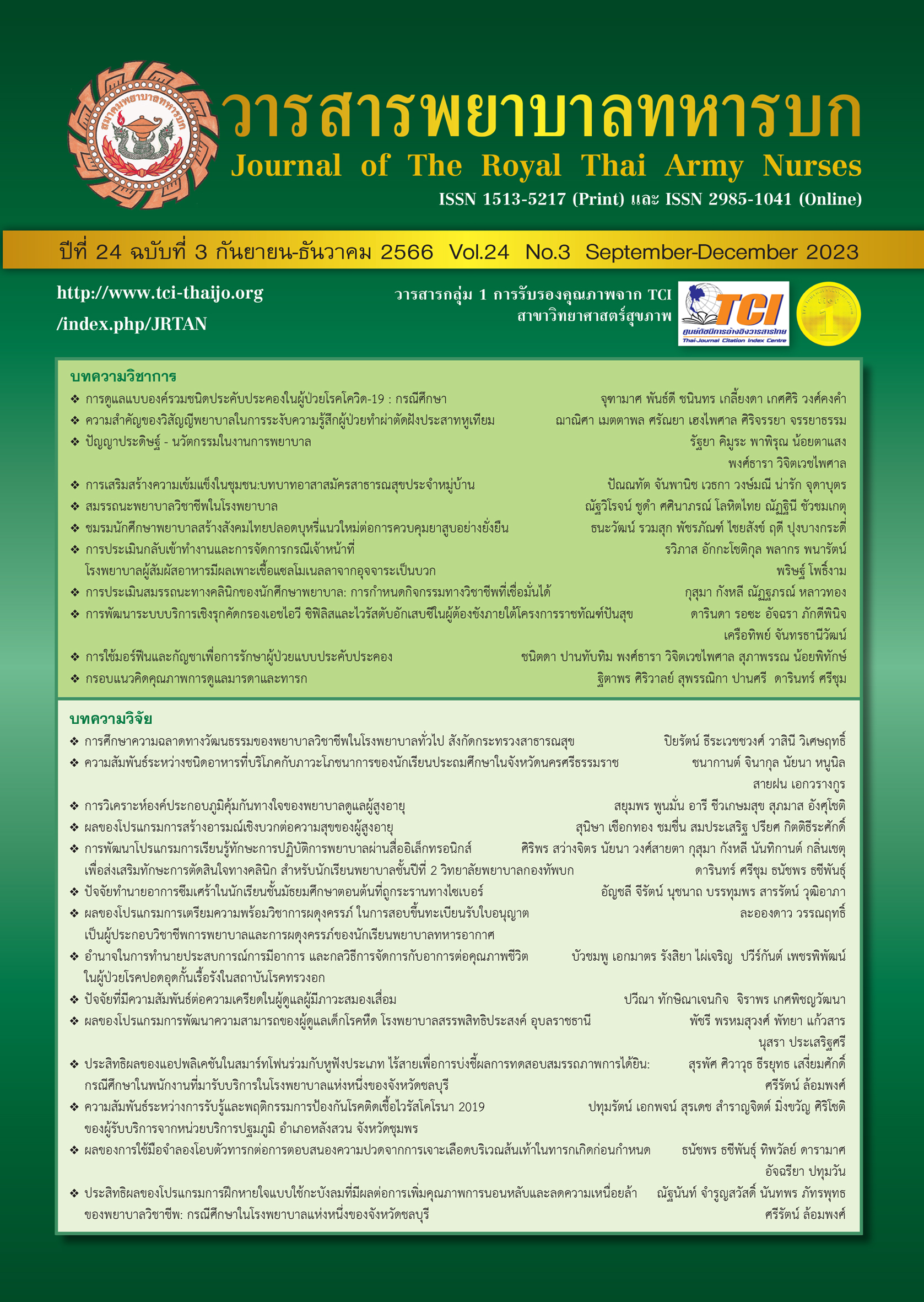Factors Predicting Breastfeeding Intention among Postpartum Mothers in the New Normal Era, Nopparat Rajathanee Hospital
Keywords:
Factors Predicting, Breastfeeding Intention, Postpartum Mothers New Normal EraAbstract
This predictive research aimed to identify factors predicting breastfeeding Intention among postpartum mothers in the new normal era. Three hundred and seventy postpartum mothers admitted to Nopparat Rajathanee Hospital were purposively selected according to preset criteria. Data were collected during March to June 2023, using self-administered questionnaire which consisted of personal information; knowledge about breastfeeding and prevention of Covid-19 infection; perceived benefits, perceived barriers, and perceived self-efficacy; and received social supports, of the postpartum mothers in the new normal era. Data were analyzed by using descriptive statistics and Logistic Regression.
Results showed that 55.1% of the samples had the knowledge about breastfeeding and prevention of Covid-19 infection at moderate level ( = 14.75, SD = 2.22); 55.7% had perceived benefits of breastfeeding at high level (
= 38.41, SD = 4.86), 42.7% had perceived barriers of breastfeeding at moderate level (
= 45.94, SD = 9.83), and 46.5% had perceived self-efficacy at low level (
= 62.36, SD = 11.44). Almost half of the samples (48.1%) received social supports at low level (
= 44.08, SD = 11.01). Maternal age, occupation, and perceived benefits of breastfeeding combined accounted for 12.9% (R2 = .129) of the variation of breastfeeding intention during postpartum period in the new normal era among the samples of this study. Recommendations: Guidelines for nurses in promoting perceived benefits of breastfeeding in preventing and avoiding disease outbreaks should be developed.
Downloads
References
Fauci, A.S., Lane, H.C. and Redfield, R.R. Covid-19 Navigating the Uncharted. The New England Journal of Medicine. 2020;382:1268-69.
World Health Organization. Breastfeeding and COVID-19 [Internet]. 2020 [cited 2020 Jul 10].
Kamonratananun N, Chai-ngam N, Wongwisaskul S, Sriwong K. Breastfeeding amidst the Pandemic of Covid-19. Kuakarun Journal of Nursing. 2020;27(2):175-85. (in Thai)
Yangthara B, Chokephaibulkit K, Wongsiridej P. Newborns care from mothers who have been diagnosed or confirmed COVID-19 [Internet]. 2020 [cited 2020 Nov 4].
Guvenc G, Yesilcinar İ, Ozkececi F, et al. Anxiety, depression, and knowledge level in postpartum women during the COVID-19 pandemic. Perspectives in Psychiatric Care. 2021;57(3):1449-58.
Nurturing the Health and Wealth of Nations: The Investment Case for Breastfeeding. New York, Geneva: UNICEF, WHO, 2017.
World Health Organization. Breastfeeding [Internet]. Geneva: WHO;2017 [cite 2018 May 30].
National Statistical Office, Thailand. Project to survey the situation of children and women in Thailand 2019, report. Complete results. Bangkok, Thailand: National Statistical Office, 2020.Thailand. (in Thai)
Kantaruksa K., Sansiriphun N., Prasitwattanaseree P. Development of Breastfeeding Promotion Models for Instructors Faculty of Nursing, Chiang Mai University and Nurses Maharaj Nakorn Chiang Mai Hospital. Nursing Journal. 2021;148(3):354-65. (in Thai)
Thongkorn A. Singhala K. Kuasit U. Kownakla J. Intention and barriers to breastfeeding among adolescent primiparous mothers. Research and Development Health System Journal. 2020;13(2):634-40. (in Thai)
Khoonphet C. Kala S. The Experience of Breastfeeding Intention among Adolescent Mothers. Printcess of Naradhiwas University Journal. 2019:11(2):1-11. (in Thai)
Pasuwan D. Success of Exclusive Breastfeeding for at Least the First 6 Months: A Case Study of Nakhon Pathom Province. Kuakarun Journal of Nursing. 2020;27(1):71-84. (in Thai)
Tipsing N, Sangin S, Suppasri P. Factors Affecting Exclusive Breastfeeding during 4-6 Week Postpartum among Mothers with Pre-pregnancy Overweight and Obese. Journal of Nursing Science Chulalongkorn University. 2019;31(1):72-84. (in Thai)
Chansiri S, Phahuwatanakorn W, Yusamran C. Influences of Breastfeeding Attitude, Subjective Norm, and Self-Efficacy on Intention to Exclusive Breastfeeding among Teenage Pregnant Women. Journal of Nursing Science. 2017;35(4):49-60. (in Thai)
Wan H., Tiansawad S.,Yimyam S. and Sriaporn P. Factors Predicting Exclusive Breastfeeding among The First Time Chinese Mothers. Pacific Rim International Journal of Nursing Research. 2015;19(1) 32-44.
Wongphinit U, Sinsuksai N, Yusamran C. Personal Factors, Social Support and Effective Suckling at Discharge in Predicting Exclusive Breastfeeding at one Month Among First-Time Mothers. Journal of The Rayal Thai Army Nursing. 2016;17(1):88-95 (in Thai)
Yamane, T. Statistics: an introductory analysis. 3rdEd. New York. Harper and Row Publications, 1973.
Tumchuae S, Kulnarid W. The study of comparison of Perceived– Benefits, Perceived–Barriers, Exclusive Breast Feeding Behavior between the Primigravida and Multipara postpartum in Saraburi Hospital. Boromarajjonani College of Nursing, Saraburi; 2006. (in Thai)
Thuancharoen Y, Prachusilp K. The Effect of Perceived Maternal Self-Efficacy Promotion Program with Husband support on Breast feeding Practice. Journal of Nursing Science Chulalongkorn University. 2008;20(3):55-68. (in Thai)
Sritong W, Payakkaraung S, Sangperm P. Intention to Breastfeeding in Mothers Receiving Breastfeeding Information from Different Medias. Nursing Science Journal of Thailand. 2022; 40(2):49-66. (in Thai)
Downloads
Published
How to Cite
Issue
Section
License
Copyright (c) 2023 Journal of The Royal Thai Army Nurses

This work is licensed under a Creative Commons Attribution-NonCommercial-NoDerivatives 4.0 International License.
บทความหรือข้อคิดเห็นใดใดที่ปรากฏในวารสารพยาบาลทหารบกเป็นวรรณกรรมของผู้เขียน ซึ่งบรรณาธิการหรือสมาคมพยาบาลทหารบก ไม่จำเป็นต้องเห็นด้วย
บทความที่ได้รับการตีพิมพ์เป็นลิขสิทธิ์ของวารสารพยาบาลทหารบก
The ideas and opinions expressed in the Journal of The Royal Thai Army Nurses are those of the authors and not necessarily those
of the editor or Royal Thai Army Nurses Association.






